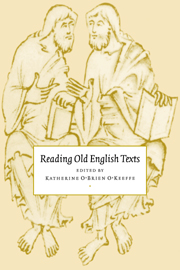Book contents
- Frontmatter
- Contents
- List of contributors
- List of abbreviations
- Note on the text
- Introduction
- 1 The comparative approach
- 2 Source study
- 3 Language matters
- 4 Historicist approaches
- 5 Oral tradition
- 6 The recovery of texts
- 7 At a crossroads: Old English and feminist criticism
- 8 Post-structuralist theories: the subject and the text
- 9 Old English and computing: a guided tour
- Suggestions for further reading
- Index
5 - Oral tradition
Published online by Cambridge University Press: 18 December 2009
- Frontmatter
- Contents
- List of contributors
- List of abbreviations
- Note on the text
- Introduction
- 1 The comparative approach
- 2 Source study
- 3 Language matters
- 4 Historicist approaches
- 5 Oral tradition
- 6 The recovery of texts
- 7 At a crossroads: Old English and feminist criticism
- 8 Post-structuralist theories: the subject and the text
- 9 Old English and computing: a guided tour
- Suggestions for further reading
- Index
Summary
When King Alfred the Great (871–99) composed the Preface to his translation of the Pastoral Care of Pope Gregory, so inaugurating an ambitious programme of educational reform, he was careful to begin with a formal third-person opening (‘King Alfred sends greetings …’) borrowed from Latin epistolary style, before slipping almost immediately into the first person (‘I’), and to pepper his prose with Latin-derived themes and motifs drawn directly from the very books which he considered ‘most needful for all men to know’. Alfred's debt to a literate and Latinate tradition in this context is both clear and unsurprising, spiced with the zeal of the newly converted; as Asser, his biographer, makes clear, the king learned to read in stages, and perhaps never learned to write. Much of his troubled life was lived without the benefit of Latin books, but with a deep devotion to the songs and poems of his native tongue. Such poems, characterized by formulaic phrasing and alliterative effects, ultimately derived from an oral tradition in the pre-literate Germanic past, although by Alfred's time such poems had already been collected in manuscripts, as an episode related in Alfred's own biography makes clear. Asser tells us how the young Alfred was enchanted by the golden letters of a manuscript version of such vernacular songs, and that his mother offered it to whichever of her sons could learn it by heart. Alfred, at that time apparently illiterate, duly learned the book from listening to it read out loud, recited the poems, and won his prize.
- Type
- Chapter
- Information
- Reading Old English Texts , pp. 101 - 123Publisher: Cambridge University PressPrint publication year: 1997
- 55
- Cited by

